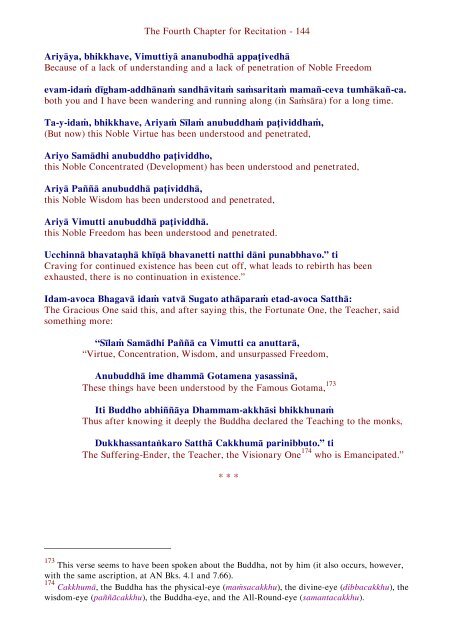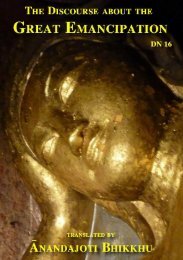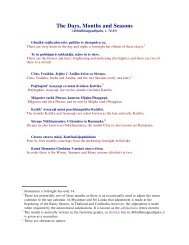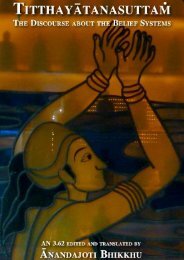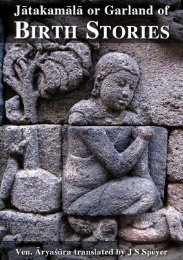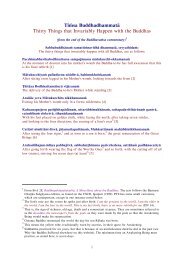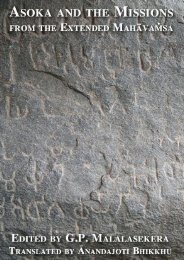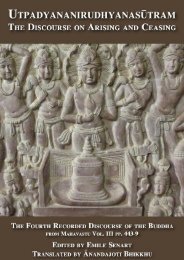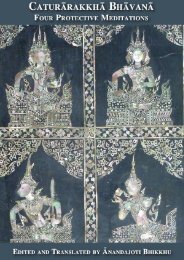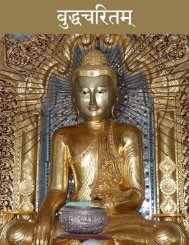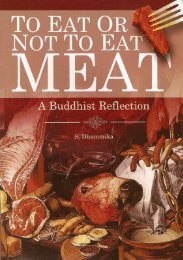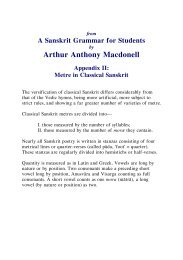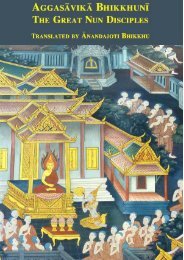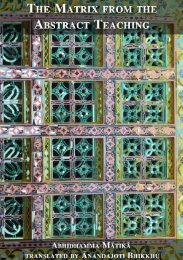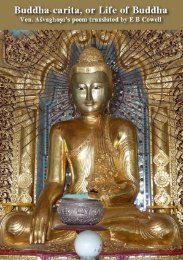Mahaparinibbanasuttam (DN 16) - Ancient Buddhist Texts
Mahaparinibbanasuttam (DN 16) - Ancient Buddhist Texts
Mahaparinibbanasuttam (DN 16) - Ancient Buddhist Texts
You also want an ePaper? Increase the reach of your titles
YUMPU automatically turns print PDFs into web optimized ePapers that Google loves.
The Fourth Chapter for Recitation - 144<br />
Ariyāya, bhikkhave, Vimuttiyā ananubodhā appaṭivedhā<br />
Because of a lack of understanding and a lack of penetration of Noble Freedom<br />
evam-idaṁ dīgham-addhānaṁ sandhāvitaṁ saṁsaritaṁ mamañ-ceva tumhākañ-ca.<br />
both you and I have been wandering and running along (in Saṁsāra) for a long time.<br />
Ta-y-idaṁ, bhikkhave, Ariyaṁ Sīlaṁ anubuddhaṁ paṭividdhaṁ,<br />
(But now) this Noble Virtue has been understood and penetrated,<br />
Ariyo Samādhi anubuddho paṭividdho,<br />
this Noble Concentrated (Development) has been understood and penetrated,<br />
Ariyā Paññā anubuddhā paṭividdhā,<br />
this Noble Wisdom has been understood and penetrated,<br />
Ariyā Vimutti anubuddhā paṭividdhā.<br />
this Noble Freedom has been understood and penetrated.<br />
Ucchinnā bhavataṇhā khīṇā bhavanetti natthi dāni punabbhavo.” ti<br />
Craving for continued existence has been cut off, what leads to rebirth has been<br />
exhausted, there is no continuation in existence.”<br />
Idam-avoca Bhagavā idaṁ vatvā Sugato athāparaṁ etad-avoca Satthā:<br />
The Gracious One said this, and after saying this, the Fortunate One, the Teacher, said<br />
something more:<br />
“Sīlaṁ Samādhi Paññā ca Vimutti ca anuttarā,<br />
“Virtue, Concentration, Wisdom, and unsurpassed Freedom,<br />
Anubuddhā ime dhammā Gotamena yasassinā,<br />
These things have been understood by the Famous Gotama, 173<br />
Iti Buddho abhiññāya Dhammam-akkhāsi bhikkhunaṁ<br />
Thus after knowing it deeply the Buddha declared the Teaching to the monks,<br />
Dukkhassantaṅkaro Satthā Cakkhumā parinibbuto.” ti<br />
The Suffering-Ender, the Teacher, the Visionary One 174 who is Emancipated.”<br />
* * *<br />
173 This verse seems to have been spoken about the Buddha, not by him (it also occurs, however,<br />
with the same ascription, at AN Bks. 4.1 and 7.66).<br />
174 Cakkhumā, the Buddha has the physical-eye (maṁsacakkhu), the divine-eye (dibbacakkhu), the<br />
wisdom-eye (paññācakkhu), the Buddha-eye, and the All-Round-eye (samantacakkhu).


